Star Trek: The Next Generation - Birth of the Federation
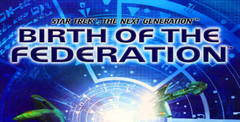
| a game by | Microprose |
| Platform: | PC (1999) |
| Editor Rating: | 6.8/10, based on 3 reviews, 4 reviews are shown |
| User Rating: | 6.8/10 - 8 votes |
| Rate this game: | |
| See also: | Download Strategy Games, Star Trek Games |
Star Trek the Next Generation Birth of the Federation was released in the same year as the movie, Star Trek Insurrection. It is not tied down to that game, but they both came out in a similar time frame, a few months if I remember correctly. I am a massive fan of The Next Generation, that was the Star Trek that I grew up with and as my dad was a fan too, we always would get the new Star Trek games, PC gamers had it made with Star Trek games back in the day and this is one that often gets forgotten about.
Rule The Galaxy
The main game mode sees you get to take control of one of five different civilizations. You can play as The Federation, The Klingons, Romulans, Ferengi, and Cardassians. There are a ton of other races/civilizations in the game as well that you will have dealings with. Everything in Star Trek the Next Generation Birth of the Federation is themed around The Next Generation so if that particular form of Star Trek does not float your boat, you may have a tough time getting into this. The goal of the game is to be the supreme force in the galaxy and to do this you have to deal with the other civilizations in various ways. You cannot just steamroll your way across the galaxy, you must use diplomacy and also develop your own civilization with various technologies and so on as well.
Captain Pickard Did Not Have It Easy
In order to reign supreme, you have a lot of work to do. There are many different tactics that you can do in this game. You can wage war, you can try and get along and you can even dabble in a bit of espionage as well. In order to get the best ships so you have a chance in battle, you will need to research technologies. There is a great deal going on and I feel that one of the strengths the game has is that everything is easy to figure out and you learn by playing. The only issue I really have with Star Trek the Next Generation Birth of the Federation is that the more areas of the galaxy you take control of, the more micromanaging you have to do. I found myself getting a bit bored the further I got into the game and while I did finish my playthrough as The Federation I never felt the desire to go back and try with a different civilization.
Engage!
The battle system in the game is very simplistic, when two ships meet you can battle and all that happens here is you will be giving orders and then watching as they happen. The AI here is not very smart at all and if you just bombard them, you will win 99/100. The battles are over very quickly. To me it is like they were an afterthought, you can move the camera around a bit if you like, but the game is not exactly a looker so I am not sure you would want to!
There are many Star Trek strategy games out there and for me, Star Trek the Next Generation Birth of the Federation is not one of the best ones. It is not a bad game by any means, it handles the strategy part pretty well. However, it is not a very exciting game and I say this as someone who loves The Next Generation. It gets rather boring and I could never see myself playing through it will all five factions.
Final Score
Pros:
- I love how it is based around The Next Generation
- You can play as five civilizations
- Lots of other civilizations for you to interact with
- There are a lot of things to keep an eye on
- It is kind of cool how it tries to have a dynamic camera
Cons:
- The whole game is not very exciting
- The AI in battles is very, very dumb!
Download Star Trek: The Next Generation - Birth of the Federation

System requirements:
- PC compatible
- Operating systems: Windows 10/Windows 8/Windows 7/2000/Vista/WinXP
Game Reviews
At a time when the real-time strategy C&C clone is so popular, it might seem strange that MicroProse have opted to make their first foray into the strategy genre using the Star Trek: Next Generation license a turn-based affair.
As LucasArts release Supremacy, their first strategy game set within the Star Wars universe, to a somewhat mixed response, it's pretty clear that for many sci-fi fans a realtime strategy game that marries a familiar C&C-style interface with units they know and love is a potential must-buy. While more complex strategy games such as Masters Of Orion are popular, it would seem quite obvious that a C&C-style Star Wars or Star Trek game would have mass appeal. "We didn't want to produce just another Command & Conquer clone," argues Jeff Holzhauer, Birth Of The Federation's producer. "We wanted to do something a little different that was more suited to the Star Trek Next Generation movies."
He's got a point. A standard Star Wars-meets-C&C clone presumably wouldn't be too difficult to produce (are you listening, LucasArts?), whereas Star Trek is a very different world. While the aim of the game is essentially to 'boldly go', the option to control one of the five major Star Trek alliances (the Federation, Romulans, Klingons, Ferengi and Cardassians) means there's potentially high replay value to be had while exploring deep space, and at the same time allocating resources for building up planetary defence, star fleets, technological advances and trade will no doubt prove a serious and intense challenge to Next Generation and strategy fans alike.
As far as combat goes, preparation is the key to success, with the emphasis on long-term strategy, resource management, formations and overall tactics rather than hands-on click and command. If it sounds a bit dull, the fact that the developers are using a customised version of the Falcon engine to portray what's going on should hopefully liven things up on-screen, although this remains to be seen.
But why not real-time? "We wanted to put as much emphasis on exploration, resource management and diplomacy as on combat," maintains Jeff. "If we did it in real time it would just be too complex and complicated to handle. In many ways it's more like Civ or Masters Of Orion - you gotta have a strategy which can evolve. You've got to prepare and plan what you do. It's a lot deeper than your average C&C clone. We want to draw the player into the rich world of Star Trek. Combat's not primarily what Star Trek is all about. It's about exploring unknown universes populated with a multitude of races, making decisions and reacting to encounters and events in the right way. We want our game to reflect that."
We first saw Birth Of The Federation some months ago, when it was obvious that this was a game that had major potential. Not only because it had a Star Trek: The Next Generation licence, but also because it was essentially from the same stable as Civilization II and Master of Orion II. Although it's not exactly what you'd call Civ in space, BOTF is similar in that it blends resource management with turn-based combat and diplomacy, and wraps it up within the massive Star Trek: Next Generation universe.
In a nutshell, you get to control one of the five major alliances - Federation, Klingon, Romulan, Ferengi or Cardassian - each with their own particular strengths and weaknesses, and go off and colonise the galaxy.
Of course, it's not just a case of sticking your flag into a planet and then moving on. Not only do you have to manage your own resources, economies and trade routes, but you also have to develop relationships with the 30-odd different races, each with their own traits and individual agendas, if you want to succeed in expanding your empire. As much emphasis is placed on your ability to successfully seek out new worlds, develop or acquire new technology, and your diplomacy as it is on kicking cosmic arse. And when the time comes that you are forced to use might, you'll be wise to remember that success on the battlefield has as much to do with how you prepare as it does with your firepower.
With this in mind, the turn-based combat in BOTF is focused on how you construct, maintain and refit your Starship fleet as much as it is on your ability to move your mouse. Engage a potential enemy at anything but full strength and you'll be lucky to get half your fleet home alive. In this respect, if the likes of C&C are for platoon leaders, then BOTF is aimed at the Generals out there who like to see the bigger picture. If you want to, you can prepare your fleet and allow the CPU artificial intelligence to fight the battle for you while you watch. You can, of course, intervene at any point, but this Csit back and watch' feature only emphasises the fact that, in true Next Generation fashion, BOTF is not about combat, war and killing, but exploration, diplomacy and tact.
Some will balk at BOTFs turn-based combat, while others will fail to appreciate the complexities of the Star Trek universe. However, if you're a fan of Civ or Master of Orion, and if you've ever watched an episode of The Next Generation, you could easily find yourself becoming totally absorbed by Birth Of The Federation.
Strategy Guide
Birth Of The Federation offers so much depth that we'd have to devote an entire issue to cover every aspect of it (Don't even think about it - Ed). Even then there would be lots of eventualities we'd have to miss out. Not only does each game start with a randomly generated map, there are also many random events that pop up unexpectedly and change the way the campaign goes. What we can provide are some general guidelines to steer you through the diplomatic minefield and resource mismanagement that stand in the way of success.
Seek Out And Explore
You start the game with a scout and a colony ship for a very simple reason: your immediate objectives are to explore the galaxy around you and start expanding. Your scout ship has the greatest range and enables you to choose which way to expand (where the uninhabited systems are, those rich in materials, those with a large capacity for growth etc). Don't spend too much time deciding where to establish your first colony though, as you need to expand quickly if you want your empire to be a force to be reckoned with (and you can count on your rivals doing the same).
You should also invest some time terraforming all the planets in the system you want to control. Habitable planets are crucial in terms of resources and future growth. If you encounter systems with dilithium, colonise them at once. Dilithium is the most precious material in the Star Trek galaxy, as it's essential for the construction of ships. Having these systems in your possession also means that other major races can't access the dilithium in them - unless they're after a fight. Don't waste time grouping your ships into task forces - at this stage speed is of the utmost importance - otherwise you'll be left lagging behind. Which ships you decide to build next depends largely on how the galaxy appears around you as you explore it. If you see that there are a number of stars within scanner range that are in opposite directions, you should build another scout ship so you can cover the maximum amount of space. On the other hand, if you've found a system with a wealth of materials and has loads of M-class planets close by, you should build another colony ship and start expanding.
Try to balance your build list with structural improvements and essential facilities - if all you do is spit out ships, you'll soon reach a point of stagnation. The next ship you do build should be a troop transport, which you can use to establish an outpost. These are essential for expanding your range and area of influence, besides being of extremely high strategic importance. If you expand quickly and early enough, you'll have a large part of the galaxy under your control before you even have to start worrying about the other major races, particularly if you're playing in a large galaxy.
The Diplomacy Game
Another way to expand quickly is to convince minor races to join you. Not only will your range grow dramatically (especially if their systems are some distance from yours), you can also use their resources and turn their worlds into factories. It's always a good idea to wait for them to develop before you offer them membership, because while a minor race is on its own it builds and evolves very quickly. Some races allow you to use special bonuses, like the Vulcan Science Academy, which boosts your research. The Bolians, the bright blue-skinned creatures, give you a 50 per cent increase in espionage, thanks to their aesthetic skills which are perfect for surgical alterations. The Mentakans give you a 100 per cent food production increase, and the Sheliaks give you a 100 percent biotech research increase.
Always try to get friendly with races that have similar features to your own, otherwise you could be wasting time and credits on a species that is never going to have more than a neutral attitude towards you. If you pretend to be loving, caring and involve your new members in wars they have no interest in, you'll see their morale drop. Always keep an eye on morale in all your systems, as it affects production ability. Content people give you an increase of up to 10 per cent, while apathetic (0% to - 13%), disgruntled (-32% to - 47%) and defiant (-50%) all decrease your production, which eventually adversely affects research and intelligence.
Make It Sore
Diplomacy might be the key to the game, but unless you have a strong military presence you'll eventually get wiped out by someone who does. It's always a good idea to build up your weapon systems with defence in mind to begin with, then think about going on the offensive.
If your outposts or starbases are threatened, leave a starship there. When enemy fleets attack, they tend to concentrate on destroying the starbase, enabling your starship to destroy them unhindered. If you leave your starbases unprotected they'll soon be obliterated.
Create task forces of warships and keep them in strategically sound places. When you're ready to go on the offensive, it's much more effective to confront an enemy fleet with a large task force than it is to have many ships scattered about. Keep command ships out of these task forces, since they only have a short range, thus crippling your strike area. To make sure the more powerful ships can reach faraway places, you need to either build outposts or gain control of minor-race systems.
When your borders have been established and you've expanded as far as you can through peaceful means, you should concentrate your production solely on warships, ignoring colony and scout ships unless they're really necessary. At this stage, troop transports are much more useful than colony ones, since they greatly reduce the time required to take control of an enemy system.
The United Federation Of Planets
Welcome, terrestrially challenged people. We don't wish to offend, we just want to be your friends
With scarcely a dishonest bone in Its multicultural body, the Federation is the only empire to be made up of several different species. It's no surprise, then, that its greatest strength lies in diplomacy - the only way to keep so many races happy Is to balance everyone's interests and find means of settling disputes other than by armed conflict.
When playing as the Federation, you need to keep your reputation in mind and remember that your citizens expect nothing less than total honesty and peaceful exploration. Declare war on an empire that isn't threatening you, or colonise a planet using brute force, and you could have a potential revolt on your hands. Likewise, break your treaties or turn your back on a friend and your people will be unhappy. On the other hand, when you play against the Federation you can manipulate their uprightness to your own advantage. Once you have their confidence, It takes nothing less than evil tactics to make them declare war on you. When they do, their first priority Is to protect their own systems. If one of them falls under your command, they'll use all their military resources to regain it.
Because the Federation expands through the generosity of its gifts to minor races, you need to convince these races to Join you first The virtuous humans (It is science fiction, after all) won't encroach on territory you've affiliated through diplomacy, but they will try their hardest to liberate the systems you conquer. Surround Federation space with systems that have become members of your empire by choice, and you effectively cut any chance for their expansion.
The Kungon Empire
We will crush you like the worthless qoghs you are
Unimpeded by a whinging moral code, Klingons get to have all the fun. They're single-minded barbarians who combine the latest technological advances in weapon research with a truly primitive mentality. In some ways, playing as the Klingons involves the complete opposite of the Federation way. You expand through violent conquest, subjugating minor races and stealing their resources. Forming peace treaties is seen as a sign of weakness; but don't be fooled, you won't get anywhere in this game unless you master the subtleties of diplomacy. Because of their strict honour code, Klingons never break their pacts. Keep your side of the bargain and they respect you; cross them and they'll treat you like pathetic children.
While you needn't worry about Klingons sneaking round your back and deceiving you, you can expect an ever-rising series of aggressive demands. During battles they pounce on any sign of weakness and show no mercy. Be sure to have a strong fleet before engaging them In battle, as they hardly ever retreat and will start launching their own attacks. Their dogged worship of war leads them to invest most of their resources in battleships and, as a result, you may find that their infrastructure Is weak. Set aside a large percentage of your sabotage reserves and hit them where It hurts.
The Cardassian Union
"Would you like to work in our concentration camp?"
Loosely based on the Nazis, this lizardy race are absolutely convinced of their own superiority and will stop at nothing to get what they want. As with the Romulans, you should be very wary of any diplomatic approach made by the Cardassians. It's usually just a ploy, and they'll betray you at the earliest opportunity. By all means join forces with them if it suits your needs at the time, but be prepared for a surprise attack and a jump from friendship to war. They won't even try to forge alliances with minor races - enslavement is the favourite past time, after all. The warning about the Romulan Intelligence applies here too. The Obsidian Order is an extremely powerful, Gestapo-like organisation that doesn't always follow government orders. It does its damndest to stop all your attempts at sabotage, while at the same time stealing information and bombing your resources.
Cheat Space Nine
If something's worth having, it's worth cheating in order to get it
If the Romulan and Cardassian way of things sit right at home with you, there's only one way to go: cheat Don't use these codes if you have Klingon blood in your veins though - think of the shame, the dishonour!
To enable the cheat mode, you need to ran the game and add '-Mudd' to the command line (for example: C:\boft\Trek.exe - Mudd, depending on where you've installed the game). Click on the Start button, and then Run. Browse your games directory until you find Trek.exe, open it, then add the extra command. It's like having Bond's Q on your side.
The Romulan Star Empire
"We come in peace... My, what a stabbable back you have"
Although descended from the pathologically peaceful and logical Vulcans, the Romulans are deceitful buggers who place their own self-interests above anything else. All their diplomatic dealings are intended to lull their victims into a false sense of security before they release the full power of their fleet It's no coincidence that the Romulans developed the cloaking device, which enables them to appear In their unsuspecting opponents' space undetected. Their possessiveness leads them to treat territorial borders as sacred - cross into their space or a disputed system and they'll treat It as a major offence Don't even bother to demand territory from them.
As you'd expect from this kind of race, they have an awesome infrastructure - their intelligence network Is especially well-developed. Once you've encountered the Romulans, it's always a good idea to step up your internal security. And beware of spying on them or trying to sabotage them, because the Tal Shiar Is extremely efficient in rooting out infiltrators and turning their capture in their favour.
The Ferengi Alliance
What's mine is mine, and what's yours is mine too
Arguably the weakest of the main races, the Ferengl's only concern Is profit. Their entire society, even their philosophy, is based on commerce and the omnipotence of money. But while they use a small amount of resources in researching and building weapons, you can be certain that they'll be buying a formidable arsenal with which to defend their profit.
Because of this obsession, the Ferengi are quite predictable. Shower them with gifts and they'll be your closest friends; refuse their economic demands and they'll raise their squeaky voices to an obscene pitch of insults.
Expansion is always based on bribery, since being at war with anyone hinders trade. Unlike other races though, the Ferengi can set up trade routes with any system, regardless of Its status of friendship (and as long as war hasn't been declared).
Finally, remember the Seventeenth Rule of Acquisition when dealing with these large-eared Del Boys: A contract is a contract is a contract (but only between Ferengi).
Top Ten Tips
Here we've condensed the strategy to achieve success into ten bite-sized, easily digestible chunks...
1 When colonising a new system, it's a good idea to buy your way to all the essentials (organics plants, fabricators...). Waiting for the microscopic population to build them takes ages.
2 When at war, position a couple of ships in an enemy system and raid it until you've sucked it dry. Then bombard it and make it yours.
3 Food is always a priority. Make sure there's a surplus so the population can grow to its full capacity. The more people you have, the faster you can build things.
4 Only buy an item on your build list if it's going to take more than five turns or if you need them desperately, otherwise you'll be spending big bucks on something you could have had for free.
5 Make use of your cloaking device if you have it. A large fleet of cloaked Strike Cruisers can worlc wonders.
6 If you play as the Klingons, peace treaties sap your morale and productivity goes out of the window. If you're looking to gain allies, sign a war pact instead.
7 Some technology fields, such as energy and biotech, are researched faster than others, so take away a percentage of research and invest it in slower technologies like weapons.
8 For every technological level you go up in propulsion, the range of your ships also increases. This is especially important if you're playing in a large galaxy.
9 Don't let the computer build things automatically unless you have dozens of systems and can keep track of them all. The AI tends to build what it wants to, rather than what the system needs.
10 The Vulcans make great members of your empire. As soon as you meet them, shower them with gifts and keep offering them friendship until they accept.
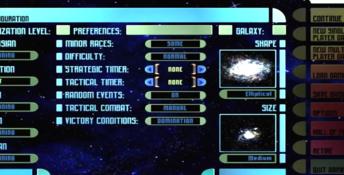
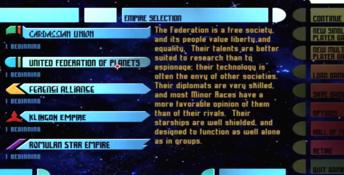



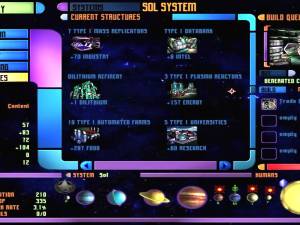

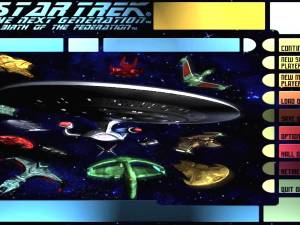
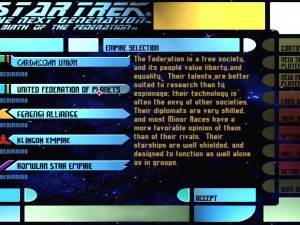


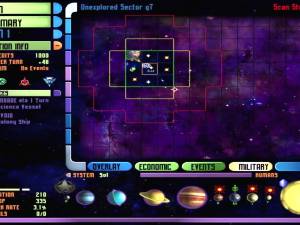


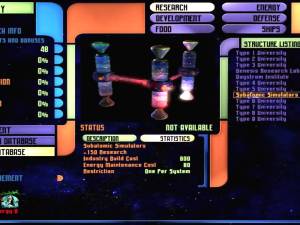





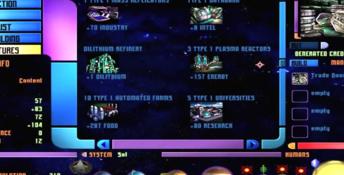
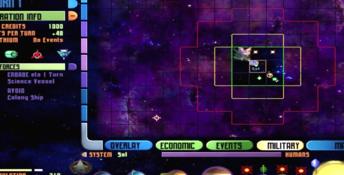

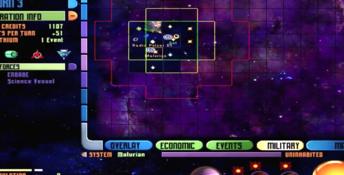
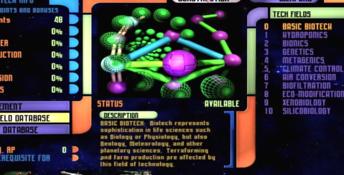
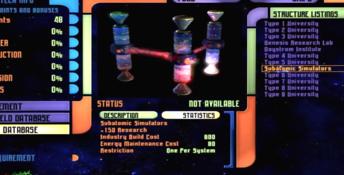
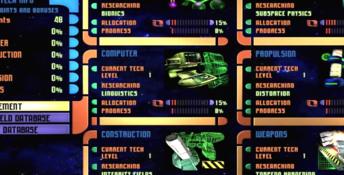
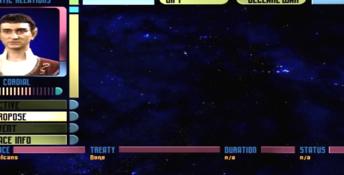
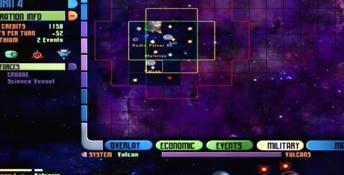
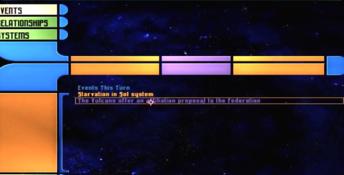
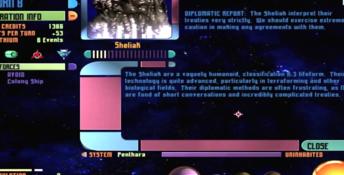
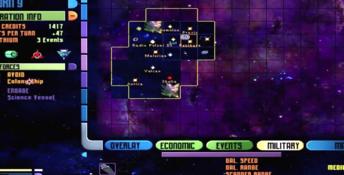
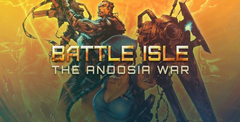 Battle Isle: The Andosia War
Battle Isle: The Andosia War Shogun: Total War
Shogun: Total War
 Star Control 3
Star Control 3
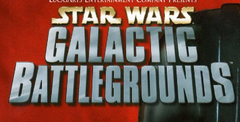 Star Wars: Galactic Battlegrounds
Star Wars: Galactic Battlegrounds
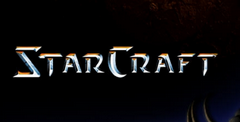 StarCraft
StarCraft
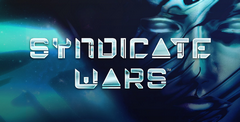 Syndicate Wars
Syndicate Wars
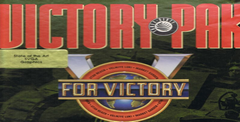 V for Victory: Victory Pak
V for Victory: Victory Pak
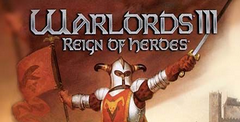 Warlords 3: Reign of Heroes
Warlords 3: Reign of Heroes